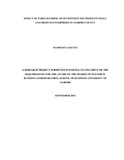| dc.description.abstract | The purpose of the study was to establish the impact of table banking on investment decisions of small enterprises in Nairobi County. To achieve the purpose, the study carried out the following specific objectives. The first was to assess the adoption of table banking by small and medium enterprises. The second was to establish the impact of investment decisions of small and medium enterprises.
The study used a survey design in examining the impact of table banking on investment decisions of enterprises. The study employed both primary and secondary sources of data collection. Primary data included structured questionnaires while secondary data involved written records. A questionnaire is a research instrument consisting of a series of questions and other prompts for the purpose of gathering information from respondents.
The study findings established that table banking which is a group funding strategy where members save and borrow immediately from their savings on the table, either in short term or long term loans improves SMEs investment decisions as it reduces huge savings on cost of construction of bank premises and leasing costs than when SMEs are using the Agency premises. It also cuts on human resource expenses. The SMEs do not have to employ new staff to manage the agency and the cost of training if any is to the bare minimum. It further, saves on equipment like furniture and computers. Additionally, the convenience of access to banking services and the extended hours that the banking agencies work is attractive features to the customer. This also helps increase SMEs‟ revenue will minimizing costs.
The study recommends that the government reduces the period of obtaining the legal documents in adopting table banking. The government should support the program and reduce the high compliance costs, bureaucracy in registration and high cost of taxation. Other areas that the study recommends include the government dealing with the cumbersome laws and regulations, corruption and illegal permits and licenses. The study recommends that regulations be efficient to enable more SMEs to embrace table banking service. The study further recommends that SMEs should fully embrace table banking through adoption of improved technology for information security to make it more reliable to the customers. This will increase volume of transactions which will lead to investment decisions. Based on the findings and conclusions presented above, the study recommends that SMEs should cushion their table banking from certain costs such as insurance costs, cash in-transit or premise set-up costs. This will enhance performance of table banking. Besides, capacity of table banking in providing services can be enhanced by SMEs ensuring that table banking have enough float that can serve more client in order to mitigate clients disappointment and increase the number of customers. They can do this by advancing credit to their table banking. In addition, SMEs should educate and regulate their table banking to ensure uniformity in service delivery so as to enhance customer confidence in table banking. The study recommends that customers should be enlightened on the operation of table banking in order to enhance their confidentiality. | en_US |

